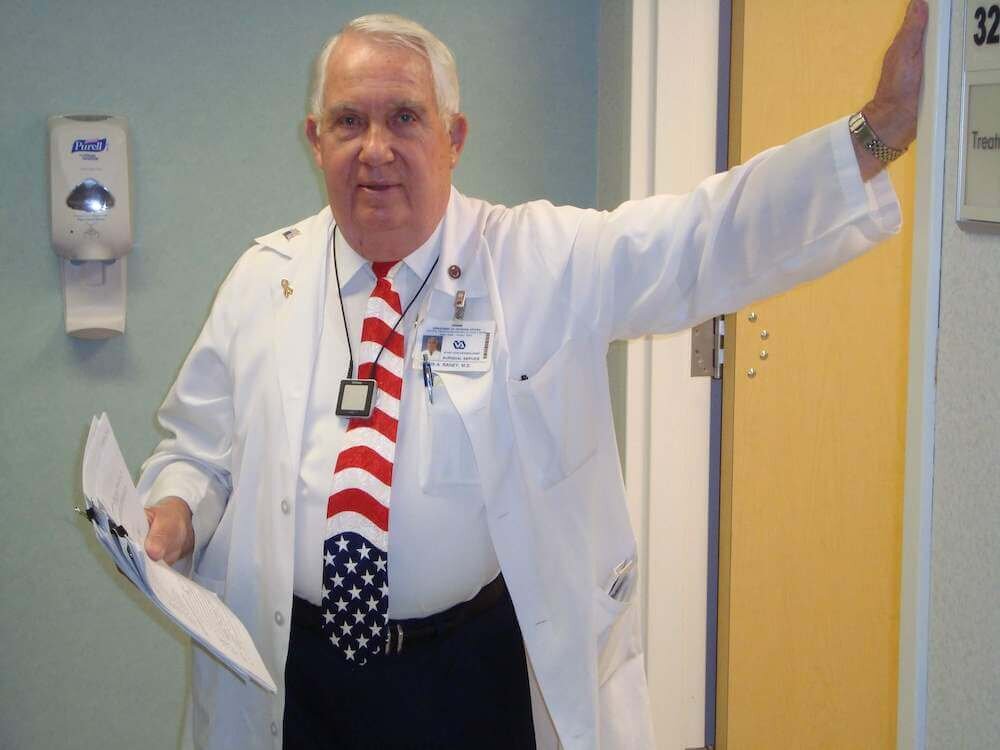By Lewis Raney, M.D.
I am an 87-year-old retired otolaryngologist–head & neck surgeon. I am writing this to present a medical mystery.
In 2016 I began to experience several health issues at the same time. I developed double vision, which was corrected using glasses, and after an extensive trip across the country to visit family and friends, an old knee problem flared up. Since my knee failed to respond to a routine cortisone injection, it was recommended that my hip be replaced.
Meanwhile, I had an existing hearing loss, but it wasn’t from my Vietnam War military service because I stayed stateside. In 1964 I was drafted into the U.S. Navy, becoming a lieutenant and the head of the ENT (ear, nose, and throat) department at the Portsmouth Naval Hospital (now the Naval Medical Center Portsmouth) in Virginia. At any rate I had, since age 71, been functioning well using hearing aids issued by my local Department of Veterans Affairs (VA) audIology division in Texas.
Lewis Raney, M.D., has been trying to solve the mystery of his worsening hearing loss following his 2017 hip replacement surgery.
Because of the long wait at the VA, I consulted a medical group in Dallas I knew about and my hip replacement surgery was scheduled for May 2017. This was successfully accomplished and I was sent home on the second postoperative day—a 150-mile drive.
I went through the rehabilitation procedures, paying little attention to my hearing although I had noticed something was wrong. Still, I was more interested in walking and driving as well as returning to work. At the time I was 83 and had already retired from the VA but continued to consult at the VA and teach third-year medical students about head and neck anatomy. Eventually I elected to no longer see patients but to continue teaching. The VA gave me emeritus status.
With the surgery and rehab completed, I started paying much more attention to my hearing and there was no question that discrimination had dropped significantly. The chief of audiology at our VA, Ryan Euer, Au.D., checked my hearing and when he came out of the test room he said, “Lewis, you are struggling to discriminate about 40 percent of speech,” and he proceeded to give me stronger amplifiers. My rechargeable Bluetooth-enabled devices by Phonak work well with telephone calls and give me wonderful binaural hearing.
To try to solve why my hearing worsened, my medical workup has included the following:
Neuropsychology exam (three hours) that found only mild clinical depression. I feel hearing loss is the major cause.
Primary care routine exam with blood chemistries all considered within typical range for my age.
Discussed results with Ira Denton, M.D., a neurosurgeon and longtime friend.
Multiple ophthalmologist visits so that I now wear glasses.
Cortisone injections into my knee for four months.
Avoided the use of many pain meds at the time of surgery, including Vicodin as it is known to be ototoxic.
An MRI, which showed only small vascular disease and evidence of two strokes 10-plus years ago (from which I had fully recovered).
My otologist, Alan Johnson, M.D., doesn’t have an explanation for my drop in hearing ability, too sudden to be attributable to age-related hearing loss. And I did also discuss these tests and results with my surgeon in Dallas and the chief of surgery at our VA. They’ve confirmed that no ototoxic antibiotics were used during my surgery pre- or postoperatively. But my hearing has definitely worsened following major bone surgery.
Could it be a reaction to the anesthesia? Or even a mini-stroke?
This past year the use of face masks has also made it difficult for hearing because, like so many others, I cannot read lips or observe facial expressions. My audiologist managed to secure for me a two-way tablet to help with my communication, from the Texas Department of Health’s Hearing Division, and I await its arrival.
I know I am lucky to be a vet with access to VA healthcare, and to have the resources of its audiology division to help me. (The VA has some 15 audiologists in three locations, with the Temple Texas VA acting as the hub for the Austin and Waco audiology clinics.) I have also been lucky to have a long and rewarding career as an ENT surgeon. In 2014, I was awarded the Lifetime Achievement Award by the Texas Association of Otolaryngology Head & Neck Surgery, and I am also honored that a retired nurse from the VA nominated me for outstanding alumnus of Tulane Medical School this year.
I keep an office at the VA, but I never go in anymore as I no longer drive. I am also still on the teaching staff of Texas A&M Medical School. But even with all this experience and information available to me, the mystery persists, so I am reaching out to the Hearing Health Foundation community to hear, pun intended, if anyone else has had a similar experience or any insights. It’s much appreciated.
Lewis Raney, M.D., lives in Texas.






I made one hat to solve problems, never imagining how many other adults and children would relate. It’s an honor to be able to give something back to the cochlear implant community that understands this journey so well.